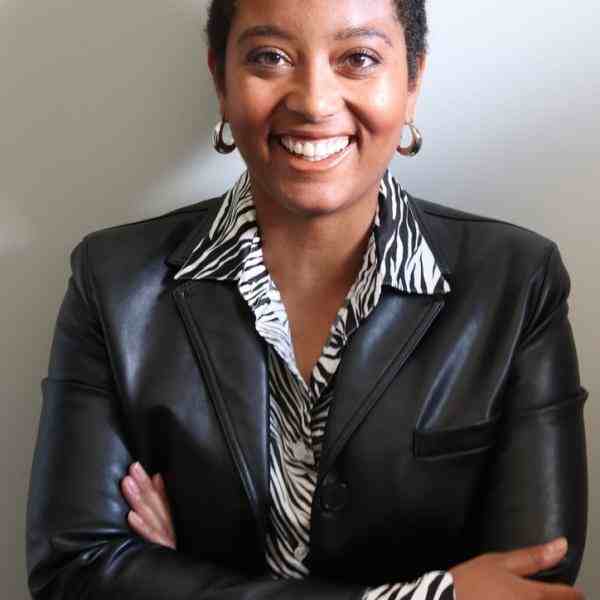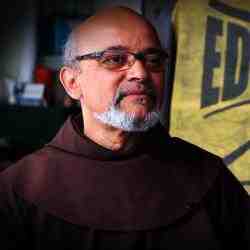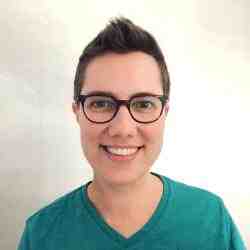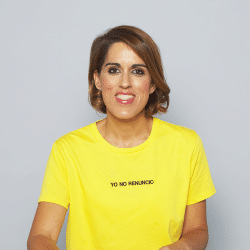Introdução
Chloe McKenzie is combating income inequality through a new paradigm for financial education, one that is honest about the financial trauma Black girls and girls of color and their families face in order to equip them to fight back and build a better future.
A nova ideia
Chloe McKenzie has designed, piloted, and spread a wholly new approach to addressing income and wealth inequities in America. At the core of her model is an early education intervention focused on Black girls and girls of color that reframes their entire financial experience from the perspective of understanding and healing from financial trauma. In doing so she challenges all of us – teachers, parents, educational leaders, policymakers and more – to embrace a new wealth justice framework without which we will never get close to addressing the effects of centuries of economic exclusion, violence, and wealth inequality.
The racial wealth gap in this country is a result of generations of exclusionary policies imposed on indigenous, Black, Hispanic, and Asian American and Pacific Islander communities that have prioritized white economic wealth and growth. And yet by and large we continue to address the problem as one of “financial literacy” – effectively shifting the blame on individuals while ignoring the larger structural reasons that contribute to and maintain vast wealth disparities. Chloe founded BlackFem as an alternative to what she considers a failed model. BlackFem teaches the concepts and skills necessary for young people to navigate financial systems, to fight back against unjust systems, and to change the way these system work, improving outcomes for themselves and their communities and ultimately closing the racial wealth gap.
Nearly every element of Chloe’s idea is different and deliberate. Her focus on Black girls and girls of color, for example, is rooted in Black feminist traditions that tell us if we target and uplift our most disadvantaged groups, we will successfully lift up and liberate all groups in the process. Chloe also believes we must begin much earlier in a student’s academic career and reach them far more often than traditional “financial literacy” programming does. Her curriculum, meanwhile, is built around a new framework of financial trauma and justice – and is more truthful about the financial realities for Black women and girls while working to empower those same girls and their communities as agents of change. Her theory of change itself is different, as she emphasizes closing the wealth gap to close the education gap, among other inequities as opposed to the other way around. The way the content is delivered is also different, as Chloe has designed her curriculum so that play and performance are embedded into existing class content to make it as easy as possible for teachers to implement. And finally, from the beginning, Chloe has understood that the classroom is a starting point – not an endpoint – for a new narrative of financial liberation that can ultimately permeate our collective consciousness and inform research and policy around the future of financial equity in our country.
O problema
In the US, a white family’s net worth is about $100,000 on average, compared to $1,700 for Black families and households. A 2010 study on women of color and wealth by the Insight Center for Community Economic Development found that nearly half of all single Black and Hispanic women in the United States have zero or negative wealth. Currently, experts believe that Black wealth will decline to zero for the upcoming generation. But Chloe argues that the problem has already arrived, and that the urgency for solutions is already here. For every dollar that a single Black man has, a Black woman has 42 cents. For every dollar that a single Hispanic man has, a Hispanic woman has nothing.
Over the past six years, Chloe has dedicated time to examining the current structure (and flaws) of financial education. In her research, Chloe has found that there is a dimension that no one is discussing: the extra-economic experience, or the relationship that a person has with money, economic trauma that they or their families may have faced, and the ways money can affect a person’s life, well-being, and sense of safety. This extra-economic dimension accounts for the historical trauma, financial experiences, and unique struggles against wealth inequality that are actually the greatest influences on a person’s wealth-building capacity – not their basic financial knowledge or literacy.
Currently, the financial landscape is not centered around the extra-economic experience. Rather, the finance industry focuses on economic growth, and faults people, rather than structural systems or financial violence, when they are unable to build personal wealth or capital. Financial literacy has been the paradigm in which wealth has been learned; a paradigm that works from the assumption that everyone has had access to financial capital in the same way that white families have in this country. The system as it exists does not teach Black girls and girls of color in particular how to intervene in our current inequitable macroeconomic system and build financial freedom for themselves.
Historically, schools have also experienced barriers that have prevented them from teaching the sort of financial education that they want to prioritize. Barriers to implementation include 1) lack of access to high quality financial resources, 2) organizational partners not being able to provide effective, culturally relevant financial education programming, 3) lack of strategy around integrating parents, teachers, and caregivers into the solution, and 4) lack of curricula that complement all dimensions of a child’s development, (i.e., cognitive, behavioral, social, and emotional development).
The gaps in affordable, accessible financial education for young girls of color and in the antiquated narratives of wealth have created an opportunity for BlackFem to transform the way that young students and their families understand and build financial freedom.
A estratégia
Chloe’s inception of BlackFem is based in traditions and theories of Black Feminism, which holds close tenets of intersectionality and is rooted in the fundamental belief that by liberating those at the bottom, everyone can be liberated. By helping Black girls and girls of color overcome wealth inequality, Chloe believes that the wealth inequality gap can be closed for everyone. This is why BlackFem’s model is taught in all sorts of school environments to all children in the K-12 system. It is also why Chloe is focused on creating a financial education system that can be taught to students as early as three years old. If, at this young age, young people can start to consider the long, free, well-resourced lives they want to live, they gain strategic decades of opportunity for education and life opportunities to serve them well. By focusing on schools, Chloe has discovered how to reach people in an early and regular way that helps students and by extension, their broader support systems (i.e., teachers, parents, and caretakers) understand principles of financial justice.
The current financial education landscape immediately explains the need for Chloe’s intervention. Before BlackFem, students received financial education at most once a month. With BlackFem, Chloe has created a curricular approach that integrates with existing content and ensures that students are receiving financial education five times a week, with evidence of increasing retention, as students have begun to display financial understanding in the 95% threshold. Most financial education curricula also do not go into classrooms for students with disabilities. Chloe and BlackFem are now the only financial education organization that has a curriculum that is accessible to students with disabilities. Chloe has also created lessons and curricula for students and communities where multiple languages may be spoken at home.
BlackFem’s curriculum is called the “WealthRise Model.” Even its name shifts students away from traditional financial literacy paradigms. Chloe believes that financial education needs to help students distinguish between “worth” and “wealth,” understand and fight against oppressive economic systems so that they can heal and learn how to name the systems of violence they may be experiencing. Through understanding the current financial system, Chloe believes that students and their families have a better chance of healing and fighting back. Rather than placing the blame for financial insecurity on students and their families, BlackFem has embraced a new financial justice model that acts as a transformative tool for Black girls and girls of color as they navigate, examine, and fight systemic and wealth inequalities. BlackFem has created new definitions and approaches so that students can understand the multidimensional relationships between financial trauma, financial abuse, and financial wealth – all terms that Chloe has developed and re-imagined. Further, by understanding what Chloe calls the ‘extra-economic’ impact of money, students can understand the societal and personal influences that may impact their relationship to money. By having lessons rooted in reality, (i.e., role-playing what it’s like to be persuaded by a bank to accept an overdraft fee), students learn how to push back blame from themselves and put it back on the systems that stifle opportunities.
Students at all grade levels that receive the WealthRise curricula learn financial education five days a week during and as part of their typical classes, including math, social studies, and English. This model emphasizes the importance and wide-reaching impacts of financial systems in all areas of life. BlackFem teaches young people about credit scores, balance sheets, banking, borrowing and lending, taxes, policies, and the ways in which these systems are designed to perpetuate financial harm and trauma, particularly for women and girls of color. Students learn not just how to most effectively interface with these systems, but how to change the systems in the long-term and improve conditions for themselves, their families, and their communities. Curricula are customized for each school, so that, for example, if young people are learning fractions in math class, the WealthRise program will allow them to practice fractions while learning skills that will enable them to build wealth and change harmful systems. Social studies curricula that already teach about taxes, laws, policies, and civic engagement will incorporate learnings from WealthRise about how these systems and tools can promote financial well-being.
The WealthRise Model has proven to be very popular among teachers, as it is embedded within pre-existing lessons so that teachers do not have to worry about re-structuring to accommodate an extra lesson. Chloe has partnered with teachers’ unions and has worked to train and compensate teachers, ensuring long-lasting partnerships with a key stakeholder that greatly influences the success of such programming. Paradoxically, this key constituency of teachers and their unions are often the last ones to be communicated with when it comes to educational policy. But Chloe starts by winning their support and trust and has created an intervention in wealth injustice that is easy for teachers to implement, and that is now the financial resource of choice at their schools.
Chloe and BlackFem’s work with schools has extended to twelve states, with about 100,000 students across all districts receiving this new, groundbreaking approach to financial education, with the potential to impact over 1 million students over the next three years, based on current demand for this new approach. To date, the organization has partnered with 20+ school districts across the US, including DC, NYC, Rochester, Chicago, and Indianapolis districts, as well as districts in Delaware and New Jersey.
Teachers and schools are not the only stakeholders that Chloe works with. Parents are also an integral part of her success. In fact, parent pressure has been a key part of BlackFem’s scaling success. By organizing student caregivers, 90% of Chloe’s scale has been supported by word-of-mouth efforts. This is because this new approach not only provides support to students, but to their families as well. By providing workshops, resources, and even helping parents open their own bank and checking accounts, BlackFem has created a deep relationship of trust with community members who can also positively impact and support children's financial learning journeys.
Based on an evaluation of BlackFem by Oliver Wyman, a management consultancy, Chloe and BlackFem have created the only program that is focused on underserved girls of color, building capacity inside and outside the classroom, and is fully integrated into the classroom. A 2018 study from The Brookings Institute titled, “Recommendations for Improving Youth Financial Literacy Education” outlined six categories of success for financial education: participatory exercises, parental involvement, Common Core alignment, supported implementation, and cultural sensitivity. BlackFem is the only organization out of seven premier financial education programs evaluated that meets all five benchmarks. BlackFem is also the first and only research-backed financial education program that provides financial education for school-aged children, their guardians, teachers, educators and community, five days a week, in both an asynchronous and synchronous context.
During the COVID-19 pandemic, Chloe worked with policymakers in Delaware and California to launch virtual programs that supported financial learning and healing for entire family units beyond the classroom. The program reached over 330K families and prompted new thinking about how school and state policy engines can collaborate to reduce wealth inequality.
Since being elected as a special relationship in 2020, Chloe’s strategy for healing financial trauma has broadened to include policy-making systems, family systems, and cultural systems. BlackFem has created actionable wealth justice strategies for each of these unique contexts that enable Black women and their communities to fully participate in the economy. Chloe’s core insight is that although BlackFem will continue to support those who struggle against wealth inequality, educating and enabling key decision-makers in policymaking and social service provision is critically important to achieve wealth justice at scale, and shifts the onus for change onto that which is broken.
To expand their scope of work and influence, Chloe developed a one-of-a-kind digital tool called the Traumagraph, which examines incidences of financial trauma across the US using qualitative and quantitative data. The tool has increased BlackFem’s visibility and led to greater access with policymakers. As of 2023, BlackFem is working in 30+ cities around the US, with 30 more on the waitlist, and a goal of being directly and deeply engaged in five cities at a time. BlackFem has been directly involved in the adoption of 62 new policies. One of Chloe’s most robust partnerships is a 3-year contract with the city of St. Paul, Minnesota that launched in July of 2023. As BlackFem’s work has grown exponentially, so has Chloe’s national influence as a thought leader on the racial wealth gap and the importance of focusing on financial trauma. Through all these efforts, Chloe aims to reach 3 million Black women in 60 cities by 2025.
A pessoa
Chloe grew up in Prince George’s County, MD, one of just seven counties in America where Black wealth is higher than white wealth. Chloe describes learning about money’s power during her childhood. She attended private school, got a car on her 16th birthday, and received a lot of privileges due to the wealth her family had. But she also learned of money’s duplicative nature and learned what it was like to become independent at a very young age.
After college, Chloe entered the financial industry as a Wall Street trader at JP Morgan, where she traded mortgages, student loans, and car loans. During Chloe’s time on Wall Street, she quickly noticed that she was often the only Black woman on trading floors of over 300 people. After a medical emergency and a few honest conversations about her role and feelings of “moral bankruptcy,” Chloe changed paths and became a financial counselor at a homeless shelter. She became determined to use her financial background to help create wealth for communities. Chloe became a teacher and received her certification in education and received a graduate degree in Public Administration and Policy from New York University. She has also received sixteen Financial Certifications in the pursuit of making BlackFem a reality.
In 2016, when BlackFem became a reality, Chloe would run the show as a one-woman team, working 16-hour days, visiting two schools a day, all while writing and updating the curriculum, the program’s development, parent workshops, school outreach, and optimizing program execution. Chloe has worked tirelessly to see BlackFem succeed. And it has.
The accumulation of Chloe’s personal and professional experiences led her to understand the wealth gap in America more broadly, which led Chloe to pioneer work and research in wealth justice so that she can now shift the financial education paradigm in this country towards a model that advocates for more equity among Black women and women of color.
Chloe is also the author of The Activist Investor, a guide to creating systems-based change through careful investing. Chloe’s leadership has been recognized and supported by Emerson Collective, PayPal’s Maggie Lena Walker award, J.P.Morgan, Goldman Sachs, and others.




